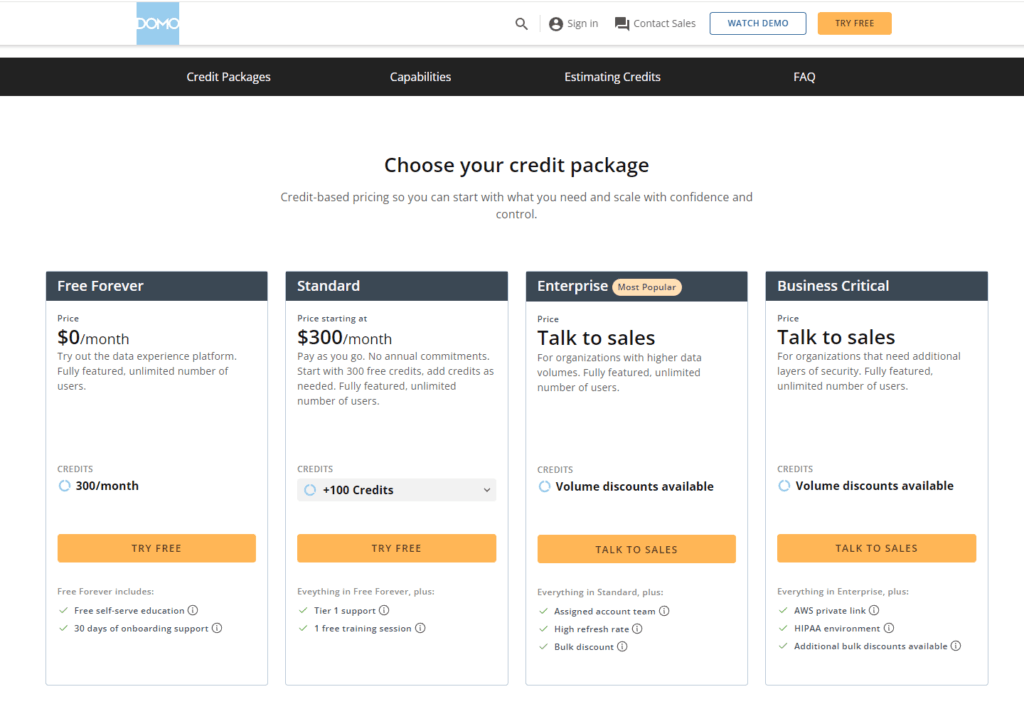Choosing the right analytics tool in today’s data-driven market can feel like navigating through a labyrinth. With myriad options available, pinpointing the one that aligns perfectly with your business objectives requires a keen understanding of each tool’s strengths and capabilities. Two contenders that often catch the eye of businesses looking to harness the power of data are Domo and HubSpot Marketing Analytics. Each platform brings its unique flavor to the table, catering to different aspects of business intelligence and marketing analytics. Let’s embark on a journey to uncover which tool might be the guiding light for your data analytics needs.
| Domo | HubSpot Marketing Analytics |
|---|---|
 |  |
| G2 Score – 4.4 out of 5 stars | G2 Score – 4.4 out of 5 stars |
| TrustRadius Score – 8.5/10 | TrustRadius Score – 8.5/10 |
Integration Capabilities: The Gateway to Comprehensive Insights
The Role of Integration in Analytics
In the modern business environment, data resides in numerous silos spread across various departments and digital platforms. The capability of an analytics tool to seamlessly integrate with these diverse data sources is crucial for providing a holistic view of business performance and customer behavior. It’s the foundation upon which actionable insights are built, ensuring that decisions are informed by a comprehensive dataset.
Domo: Master of Data Orchestration
Domo is renowned for its expansive approach to data integration. Boasting connections with hundreds of data sources, Domo simplifies the process of funneling data from across the business landscape into a single, centralized analytics platform. From social media metrics and CRM data to financial systems and operational databases, Domo’s pre-built connectors and custom integration options ensure that no data stone is left unturned.
This robust integration capability is complemented by Domo’s data transformation tools, allowing users to clean, manipulate, and prepare data for analysis within the platform. It’s a holistic approach that not only aggregates data but also ensures it’s in the right format for generating meaningful insights.
HubSpot Marketing Analytics: Specialized in Marketing Data
While Domo casts a wide net in terms of data integration, HubSpot Marketing Analytics takes a more focused approach, honing in on marketing data. It excels at integrating data from various marketing channels, including email campaigns, social media, web analytics, and more, providing a unified view of marketing performance.
HubSpot’s strength lies in its seamless integration with the HubSpot CRM and other marketing tools within its ecosystem. This integration ensures that marketing analytics are not viewed in isolation but as part of the broader customer journey. It enables marketers to track the effectiveness of their campaigns from first touch to final sale, providing insights into every step of the buyer’s journey.
User Experience and Accessibility: Simplifying the Complex
The Importance of Intuitive Design
In the digital age, where data is a critical asset, the ability of users to navigate, understand, and utilize analytics tools is paramount. An intuitive user interface (UI) and seamless user experience (UX) are essential for ensuring that valuable data insights are accessible to all, not just data scientists or IT professionals. Let’s compare how Domo and HubSpot Marketing Analytics stack up in making data analytics approachable and actionable.
Domo: Designed for Broad Engagement
Domo is acclaimed for its commitment to creating a seamless and engaging user experience. It’s designed to cater to users of varying expertise levels, from data scientists to business executives, making complex data analytics accessible to a broader audience. Domo achieves this through a highly intuitive interface where data visualization and manipulation are simplified through sophisticated yet user-friendly functionalities. The platform enables users to quickly find the data they need and transform it into visualizations that make insights clear and compelling.
One of Domo’s key strengths is its dashboard customization capabilities, which allow users to create tailored views of data that align with their specific roles and requirements. This level of personalization enhances the relevance of data insights for different users, promoting wider adoption and engagement across the organization. Furthermore, Domo’s commitment to accessibility extends to its mobile application, ensuring users can access critical business insights anytime and anywhere, thus fostering a culture of informed decision-making wherever they are.
HubSpot Marketing Analytics: Focused on Marketer-Friendly Insights
On the other hand, HubSpot Marketing Analytics provides a user experience finely tuned to the needs of marketers. The platform simplifies the analytics process by presenting marketing data in an understandable and actionable format. This is particularly beneficial for marketing professionals who may not have a deep background in data analysis but need to quickly assess the performance of their campaigns and make data-driven decisions. HubSpot excels in integrating marketing data with actionable insights, allowing marketers to not only see what is happening but also understand why it’s happening and how they can improve.
HubSpot’s seamless integration with the broader HubSpot ecosystem, including its CRM and suite of marketing tools, enhances the user experience by providing a unified platform for managing marketing efforts. This integrated approach ensures that insights derived from analytics are easily applied to marketing strategies, email campaigns, and customer relationship management, providing a streamlined workflow from analysis to action.

Related: Check out our free SEO suite

Cost-effectiveness and ROI: Maximizing Value from Your Analytics Investment
Evaluating the Investment in Analytics
The true cost of any analytics tool isn’t just found in its subscription price but in the value it brings to the organization. This value can be measured through improved decision-making, enhanced customer insights, increased operational efficiency, and ultimately, a positive impact on the bottom line. Let’s delve into how Domo and HubSpot Marketing Analytics measure up in providing value for their cost.
Domo: Enterprise-Wide Analytics at a Premium
Domo positions itself as a high-end, all-in-one business intelligence platform, designed to cater to large enterprises or organizations with extensive data analytics needs across multiple departments. Its pricing reflects this positioning, with a structure that’s typically tailored to each organization’s specific requirements, including factors like the number of users, data volume, and the range of integration needs.
While Domo’s upfront cost may be higher compared to some other tools, its value proposition lies in its comprehensive approach to data analytics. By offering extensive integration capabilities, customizable dashboards, and real-time data analytics across all facets of an organization, Domo aims to provide a level of insight and efficiency that can significantly impact strategic decision-making and operational improvements. For businesses that can fully leverage its wide-ranging features, the ROI can be substantial, justifying the initial investment.
HubSpot Marketing Analytics: Targeted Insights with Clear Pricing
HubSpot Marketing Analytics, part of the broader HubSpot platform, offers a more focused approach to analytics, specifically tailored to marketing performance. Its pricing is more transparent, with tiers that cater to different sizes of businesses and marketing teams, from small startups to larger enterprises. Each tier offers a progressively broader set of features, from basic analytics to advanced automation and reporting capabilities.
The ROI from HubSpot Marketing Analytics is most directly realized in the marketing domain, where its insights can drive more effective campaign strategies, better customer segmentation, and improved conversion rates. The platform’s integration with the HubSpot CRM and suite of marketing tools enhances this value, providing a seamless flow from analytics to action. For organizations primarily seeking to optimize their marketing efforts, HubSpot offers a cost-effective solution with a clear path to realizing a positive return on investment.
Customization and Flexibility: Tailoring Analytics to Fit Your Business
The Need for Tailored Insights
In the diverse landscape of modern business, a one-size-fits-all approach to analytics rarely suffices. Organizations operate in unique environments, with distinct challenges, goals, and data ecosystems. The flexibility of an analytics tool to adapt to these conditions, allowing for customized reporting, dashboarding, and analysis, is crucial for deriving relevant insights that can drive strategic decision-making.
Domo: Versatile Customization for Enterprise Needs
Domo stands out for its emphasis on customization and flexibility, designed to serve the broad and varying needs of an enterprise. It provides users with powerful tools to create customized dashboards and reports that can reflect the specific metrics and KPIs most relevant to their business objectives. The platform’s drag-and-drop interface facilitates easy manipulation of data visualizations, ensuring that insights are presented in the most impactful way.
Moreover, Domo’s flexibility extends beyond just visual customization. The platform supports a wide range of data integrations, with the capability to tailor data connections and transformations to fit the unique architecture of an organization’s data ecosystem. This adaptability makes Domo an invaluable tool for businesses seeking a comprehensive analytics solution that can evolve with their growth and changing data strategies.
HubSpot Marketing Analytics: Streamlined Customization for Marketing Optimization
HubSpot Marketing Analytics, while offering a narrower focus compared to Domo, provides a high degree of customization within its domain of marketing analytics. The platform allows marketers to tailor dashboards and reports to highlight the performance metrics that matter most to their campaigns and objectives. This focus ensures that marketing teams can quickly access the insights they need to optimize their strategies.
HubSpot’s customization capabilities are further enhanced by its integration with the HubSpot CRM and the broader suite of HubSpot tools. This ecosystem approach enables marketers to seamlessly align their analytics with marketing automation, email marketing, and customer relationship management, providing a unified view of marketing efforts and their impact on customer engagement and conversion.
Collaboration and Sharing Features: Enhancing Team Synergy
The Importance of Collaboration in Analytics
The power of analytics is not just in uncovering insights but also in the ability of an organization to act on these insights swiftly and cohesively. Collaboration features within an analytics platform can facilitate this by allowing teams to share data, reports, and insights effortlessly, fostering a culture of informed decision-making. Additionally, sharing features ensure that insights reach the right stakeholders at the right time, enabling organizations to respond dynamically to emerging trends and challenges.
Domo: Promoting Organizational-wide Collaboration
Domo is designed with collaboration at its core, offering a suite of features that promote sharing and teamwork not just within teams but across the entire organization. Its platform facilitates the creation of shared dashboards and reports that can be easily accessed by stakeholders, ensuring that everyone is on the same page regarding the latest data insights.
Moreover, Domo’s platform includes built-in communication tools, such as commenting and alerting features, which allow team members to discuss data points directly within the platform, streamlining the decision-making process. These features are invaluable for organizations that prioritize agility and wish to cultivate a data-driven culture across all levels of the business.
HubSpot Marketing Analytics: Streamlined Sharing for Marketing Teams
HubSpot Marketing Analytics focuses on providing specialized collaboration features tailored to the needs of marketing teams. Within the HubSpot ecosystem, users can easily share reports and dashboards with colleagues, integrating insights directly into marketing campaigns and strategies. This seamless sharing capability ensures that marketing teams can quickly align on performance metrics, campaign results, and customer engagement strategies.
Additionally, HubSpot’s integration with its CRM and sales platforms allows for a seamless flow of information between marketing, sales, and service teams, ensuring that insights derived from marketing analytics inform broader business strategies. This level of integration supports a collaborative approach to customer relationship management, aligning efforts across departments to enhance customer experience and drive growth.
Pricing
Domo

HubSpot Marketing Analytics

Conclusion
Domo emerges as a versatile, all-encompassing solution, offering broad integration capabilities and extensive customization options that cater to a wide array of business intelligence needs across an enterprise. Its commitment to a seamless user experience and organizational-wide collaboration positions Domo as a formidable choice for companies seeking a holistic view of their operations, underpinned by data-driven insights accessible to all layers of the organization.
HubSpot Marketing Analytics, with its focused approach, shines in providing specialized insights for marketing teams. Tailored to streamline marketing data analysis, HubSpot simplifies the journey from data to decision, offering marketers an intuitive platform that integrates closely with CRM and other marketing tools. This focus ensures that marketing professionals have the insights they need at their fingertips, enabling them to craft strategies that resonate with their audience and drive growth.
Read Next:
- 15 Best Inventory Management Software for Your Business
- How to Choose the Right Inventory Management Software for your E-commerce Business in 2023
- 13 Best ERP Systems for You in 2023: Reviewed
- Key Elements of a Website Development Agreement: An International Perspective
- 31+ Top Social Media Management tools Compared! (2023)






















Comments are closed.